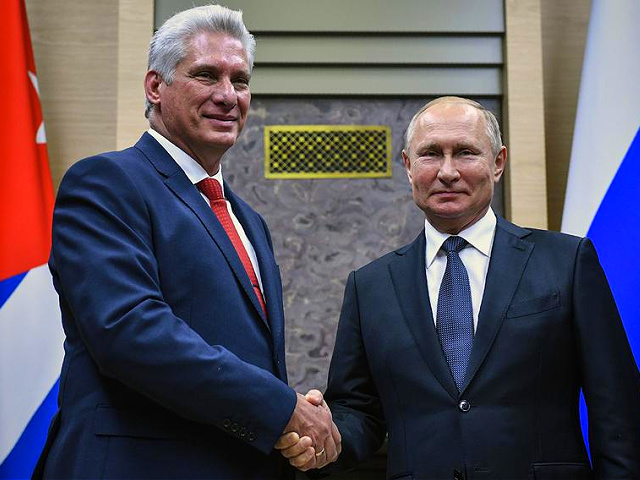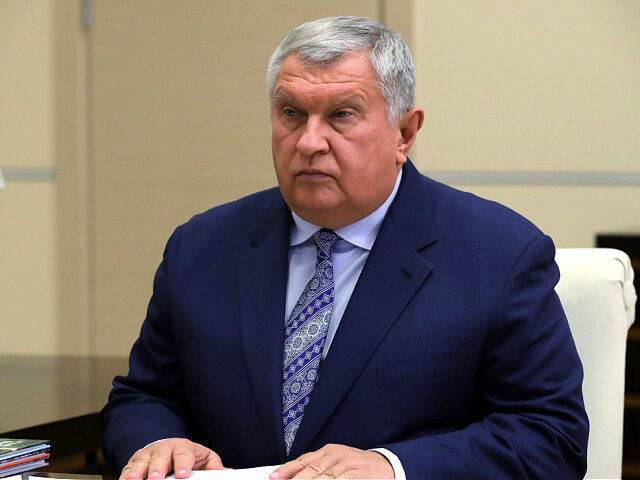Russian state-oil corporation Rosneft’s CEO Igor Sechin visited Cuba over the weekend to meet Castro regime figurehead President Miguel Díaz-Canel and discuss “mutual collaboration.”
During the meeting, the Cuban presidency said in a readout, Díaz-Canel and Sechin reviewed “issues alluding to mutual collaboration relationships, especially with regard to the energy sector,” without publicly specifying further. The meeting occured as Cuba faces severe nationwide fuel shortages, one of several chronic government problems caused by decades of communist mismanagement.
The Castro regime said the meeting with Sechin — whom they described as an “admirable friend of Cuba” — was a continuation of the agenda established after Díaz-Canel visited Russia and other countries in November, seeking aid for the ailing 63-year-old communist regime. The Castro regime’s figurehead “president” thanked Russia and Vladimir Putin for “understanding the situation in Cuba” and for “doing everything we can do jointly to move forward.”
Sechin, who is also the First Secretary of the Russian Communist Party Central Committee, ensured to Díaz-Canel that Putin “directly and personally” supervises all issues and questions concerning the cooperation between Russia and Cuba.
“On my return, I will certainly convey to you the results of our talks,” Sechin said.

Russian President Vladimir Putin meets with Cuban President Miguel Diaz-Canel at the Novo-Ogaryovo state residence outside Moscow on October 29, 2019. (ALEXANDER NEMENOV/POOL/AFP via Getty Images)
Sechin’s visit to Cuba marks the second publicly known visit of a high-ranking Russian official to the island-nation in March so far. Last Wednesday, Nikolai Patrushev, secretary of Russia’s Security Council, traveled to Cuba to meet with Díaz-Canel and recently unretired Raúl Castro, the most powerful person in the country and brother of Fidel Castro. Patrushev reportedly visited to discuss “international problems” and how to deepen bilateral cooperation between Russia and Cuba. Patrushev briefly stayed in Cuba after traveling to Venezuela and Algeria.
Cuba’s communist system has left the country’s entire infrastructure in shambles — literally, in the cases of the regularly collapsing buildings of Havana. Public outrage prompted citizens to hold over 4,000 anti-communism protests in 2022 calling for an end to the ruling 64-year-old communist regime.
The worsening situation in Cuba — which has led to the worst migrant crisis in Cuban history — has prompted the communist regime to deepen its ties with Russia in recent years, including military cooperation. In February, Russia sent a donation of 25,000 tonnes of wheat to Cuba to combat shortages in the island nation.
Cuba, whose alliance with Russia goes back to the Soviet era, is one of Russia’s closest ideological allies in Latin America, alongside the other two authoritarian regimes in the region, Venezuela and Nicaragua. All three authoritarian regimes have expressed their continued support of Russia in its ongoing invasion of Ukraine.
Throughout 2022, Cuba has been facing a worsening nationwide fuel shortage. The communist regime finally admitted to the shortage in October, blaming it on “logistical operational difficulties” and “higher than usual demand” for diesel fuel. Diesel is indispensable for the operation of fuel-powered electrical generators, used to offset the effects of the nation’s worsening blackouts, a product of its crumbling and obsolete power grid.
By February 2023, the drastic fuel shortages paralyzed most of Cuba’s public transportation vehicles, prompting the Castro regime’s authorities to call government officials or government entities to carry passengers waiting at bus stops free of charge.
Since its arrival to power more than two decades ago, the Venezuelan socialist regime has been supplying the communist Castro regime with oil in exchange for Cuban slave doctors — however, Venezuela’s drastic drop in oil output as a consequence of the collapse of its own socialist system has caused frequent declines in the number of barrels of oil received by Cuba in recent months, only jumping back to 53,320 barrels per day in February.
Christian K. Caruzo is a Venezuelan writer and documents life under socialism. You can follow him on Twitter here.

COMMENTS
Please let us know if you're having issues with commenting.